20 Tips For Making Flawless Pumpkin Pie
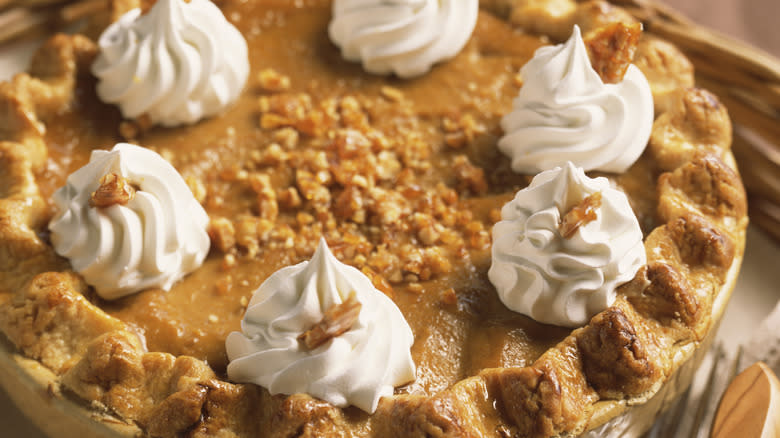
The star of your holiday table isn't the beautiful bird, glazed ham, or soft dinner rolls — it's actually the pies. Specifically, the favorite of all autumnal pies: pumpkin. Historical records indicate that this pie graced American tables since as far back as the 17th century. One town in Connecticut even postponed Thanksgiving celebrations in 1705 because there wasn't enough molasses to make the classic pie recipe. Since then, pumpkin pie has appeared in pop culture, in writing, and, most importantly, on tables during the cool fall and winter months.
Although pumpkin pie is a staple for a holiday spread, it still sparks a sense of uneasiness among bakers and home cooks alike. The foreboding custard filling, combined with a crust that tends to slump, results in a tricky recipe that leads many folks to just buy a pre-made version at the grocery store before the holidays. Even we are not immune to having an unsightly crack in our pumpkin pie. Our research and test-kitchen experiences of making this dessert have led us to crack the code for making dreamy pumpkin pie at home, and here we reveal our secrets.
Read more: 30 Types Of Cake, Explained
Keep The Butter In Your Crust Cold

The key to making an excellent pumpkin pie isn't just in the filling — it's in the crust too. The standard crust for a pumpkin pie is the same as what you'd use for a fruit or a pecan pie. The mixture for a flaky pie crust recipe combines fat (often butter, but occasionally lard, coconut oil, or shortening) with flour, salt, sugar, and splashes of ice-cold water and chilled vodka to bring the dough together. As the pie bakes, the water steams out to enhance the formation of flaky layers that a good pie crust is known for.
The key to getting this desirable texture in your pie crust is to avoid letting the butter get too warm before baking. In the oven, cold butter also steams to create tiny air pockets that make the dough puff into layers, while warm butter combines too readily into the flour and renders your crust tough. Use cold butter in the crust and remember that it's important to double-chill pie dough — both after incorporating the butter into it and after it's been rolled and shaped into the pie plate — to prevent the butter from warming before baking.
Always Par-Bake Your Crust

In addition to ensuring that your butter is kept cold while making the crust, you should also plan to par-bake it. Par-baking pie crust is vital for types of pie recipes that have filling and crust with different baking times. Unlike blind baking, which involves baking the crust with pie weights until it is fully cooked through, par-baking only gives the crust a head start toward achieving a perfect shade of golden brown. Then, once the crust has been lightly baked, the shell is cooled and the filling is added for the final baking stage.
Par-baking is an important step for baking custard-based pies like pumpkin, because this type of dessert is notoriously wet, which can cause a dreaded soggy bottom. To prepare your crust for par-baking, be sure to fill it with pie weights or dried beans to keep it from puffing up in the oven, and dock it with a fork to allow steam to escape.
A Cocoa Crust Will Highlight The Squash Flavors

There are some things in this world that just go together. Peanut butter and jelly, coffee and donuts, and ... pumpkin and chocolate. This unique flavor combination is in the "don't knock it till you try it" camp.
The cocoa notes are complemented well by the cinnamon and cloves in the filling, providing a major upgrade to your pumpkin pie. Instead of adding cocoa powder to your pie filling, which would make it gritty, you'll want to substitute some of the flour with this ingredient in your pie crust. You may also have to add a little extra sugar to the crust to combat some of the bitterness from the cocoa powder, but we think the bittersweet notes add a bit of complexity to the pie.
Substitute Plain Crust For A Cookie One

A standard pastry-dough crust is the plain Jane of the pie world. It's timeless, classic, and allows the pie fillings to be at the center of attention. But Alton Brown's secret to amazing pumpkin pie ventures away from the realm of tradition and goes with a crust that will elevate the flavors of the pie with a unique crunch.
Brown makes a cookie crust from crumbled ginger snaps pulsed in a food processor with ground ginger and brown sugar. Then, he drizzles in melted butter until the crust comes together. Like a standard pie crust, you should also par-bake this cookie-based crust until it firms up before adding the filling, and then baking the pumpkin pie as usual.
Stick With The Canned Filling
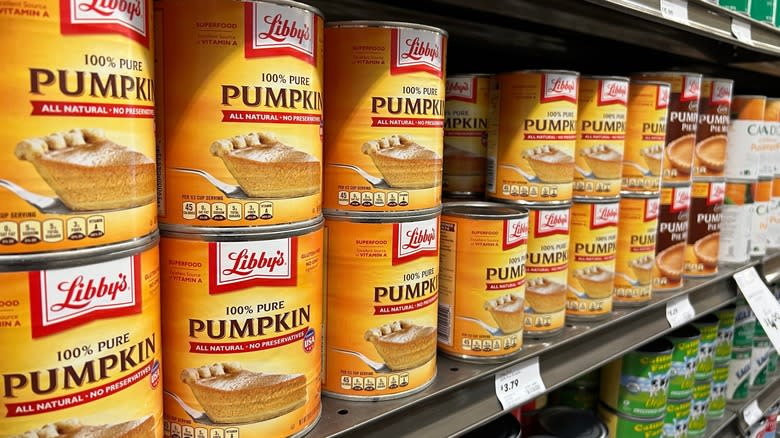
We love the feeling of trying to make something homemade — but pumpkin puree is one ingredient that you should never, ever try to make yourself, because buying the canned version is a foolproof secret to making great pumpkin pie.
The primary reason why you should think twice before using fresh pumpkin in your pie is because the raw gourd has a very high water content. Not only will using fresh pumpkin result in a filling that won't cook quite the same as canned pumpkin puree, but you'll notice that the flavor is bland and the texture is much grainier than if you use the canned variety.
If you are dead set on making your own puree, you'll need to remove as much water as possible from the squash by running it through a cheesecloth and sieve. It's an arduous process, to say the least.
Cook The Pumpkin Puree Before Adding It To The Filling

Pumpkin puree can have a bit of an immature taste. This ingredient, which is vital for pumpkin pie, tends to lack flavor on its own, so you may have to take a couple of extra steps to amp up the flavor. The simple method for a more flavorful pumpkin pie is to precook your puree with sugar and spices over medium-low heat for no more than five minutes. This will give the flavors an opportunity to meld together, while moisture is cooked off and flavors are concentrated.
You can also go a step further and caramelize canned pumpkin for richer, tastier pies. To get a darker, more complex flavor, cook the puree on the stovetop until it darkens and produces a caramel aroma. Then, remove it from the heat and stir in the rest of your ingredients. Alternatively, you can also cook down the puree in an Instant Pot with butter for 20 minutes.
Get Some Help From Tofu
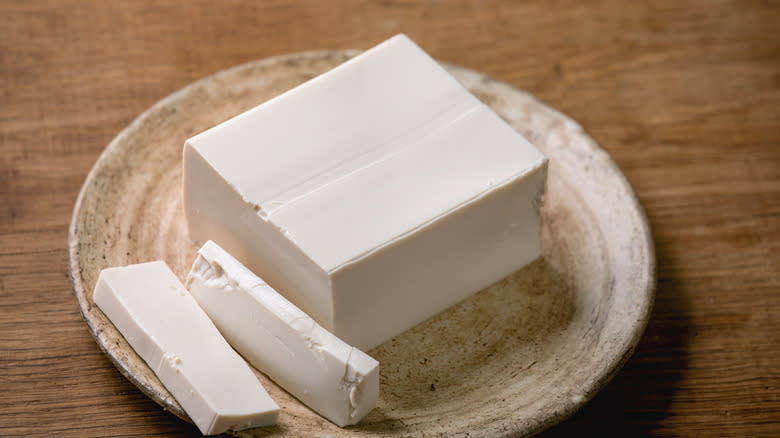
Tofu is a no-go food for many folks, but it's one you should consider adding to your pumpkin pie. You can substitute this ingredient for eggs and milk to make a vegan rendition of the filling recipe, while using a plant-based butter or butter substitute in the crust.
The high moisture content of the tofu will help bind together the other ingredients, while the mild flavor of the ingredient won't impose on your spices. Use silken tofu for this recipe, which can be found in the Asian-foods section of your grocery store. The texture of this tofu is custardy and soft, compared to the firm or extra firm spongy tofu you'd find in a stir-fry.
Add A Citrus Kick To Amp Up The Flavor
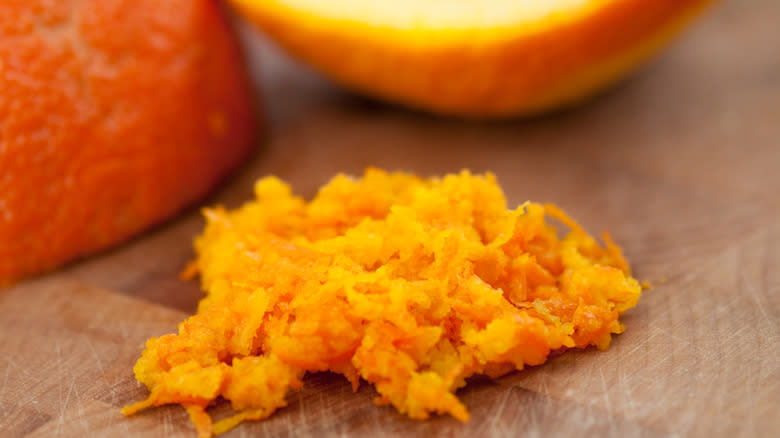
Pumpkin tends to be especially heavy, and can use a bit of something to lighten it up. You can infuse pumpkin pie crust with orange zest for a bright flavor punch and help balance out the flavors. To add this ingredient, rub sugar together with some orange zest. This extraction will help pull out the essential oils in the citrus, while the sugar will balance out any astringent notes. Add this infused sugar to your pie crust ingredients and proceed as normal. You can also whisk the orange zest straight into the flour if your crust recipe doesn't include sugar.
There are several other ways to enhance your pie with orange. You can substitute the cold water in the pie crust with a splash of orange juice, or add a bit of finely grated zest into the pie filling.
Use Creamy Cheese To Improve The Texture
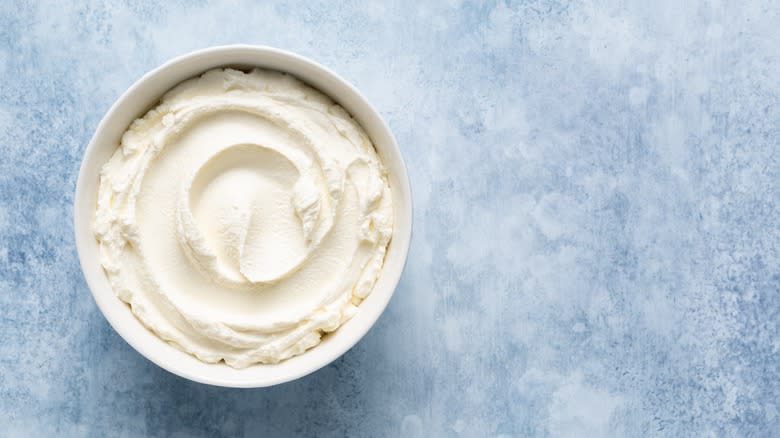
The classic pumpkin pie recipe is made with a few staple ingredients: pumpkin puree (duh), eggs, sweetened condensed milk, and spices. But kitchen pro Giada De Laurentiis makes her pumpkin pie recipe unique by adding a scoop of mascarpone cheese to the mix. This cheese has a high butterfat content, so it imparts a smooth mouthfeel to the pumpkin filling. De Laurentiis also adds whipped cream cheese to her mixture to further bolster the consistency. Her recipe includes blending the two cheeses together with the other filling ingredients before pouring the mixture into a pie crust and baking. For added flavor, she also uses lemon zest in the pie filling — which can help curb the fattiness of the cheese.
Use Different Types Of Cinnamon To Add Warmth

There's a lot you can do with pumpkin pie by simply swapping out components with more flavorful ones. The subtle ingredient swap that adds some extra spice to pumpkin pie involves switching out your common cassia cinnamon with Ceylon cinnamon. The former variety is common in most grocery stores and has a profoundly bold, hot flavor. Ceylon cinnamon has a lighter flavor and sweeter undertones, which makes it a better fit for your pumpkin pie than cassia.
Besides Ceylon cinnamon, we also recommend adding Saigon cinnamon to your pie. It has a more potent flavor than Ceylon cinnamon, and can be found at specialty retailers or stores at a lower price point than Ceylon cinnamon. Naturally, since the Saigon variety tends to be quite potent, you may have to play with the amount you add so that you won't obstruct the pie's clove undertones.
Venture Into The World Of Savory Spices
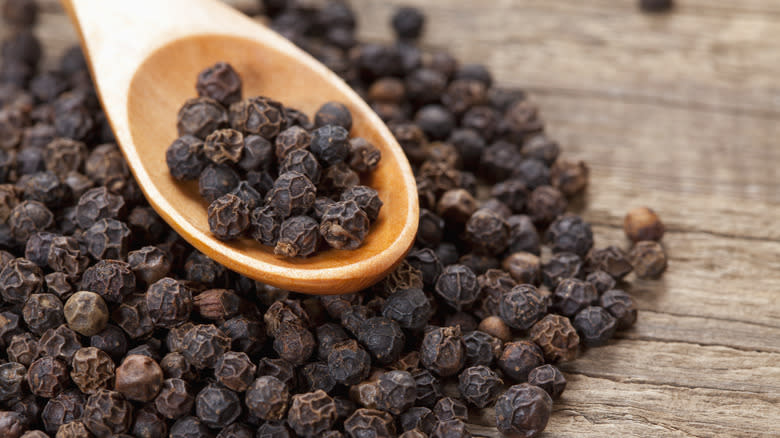
You don't have to use only pumpkin pie spice in your recipe. You can also venture into the world of savory spices to make your pumpkin pie filling unique. For example, black pepper adds a new depth of flavor to pumpkin pie. Finely ground pepper will impart the most spicy flavor to your pie, while coarse ground pepper will add visual flair and a sharp bite to each forkful.
Alternatively, Ethiopian-born celebrity chef Marcus Samuelsson adds garam masala to his pumpkin tart for a bright, warm flavor. This Indian spice blend includes cinnamon and cloves (which are already standard for pumpkin pie) along with cardamom, cumin, and coriander. Garam masala teeters on the line between savory and sweet, making it a great addition to pumpkin pie.
Stick The Filling In The Fridge Before Baking

The star of the pumpkin pie show isn't just the squash, it's also the medley of spices like cinnamon, cloves, and nutmeg that you include in the filling. To set these sweet seasonings center stage, you should refrigerate pumpkin pie filling before baking. The extra time in the fridge will allow the spices to bloom and release a stronger aroma and taste into your filling.
Beside releasing the spices, refrigerating your pie filling before baking it will allow the ingredients to mix together more seamlessly and create a more consistent texture. Ideally, you should make your filling the night before you plan to bake the pumpkin pie, but even a few hours in the fridge will drastically improve your pie.
Add A Hint Of Crunch With Praline
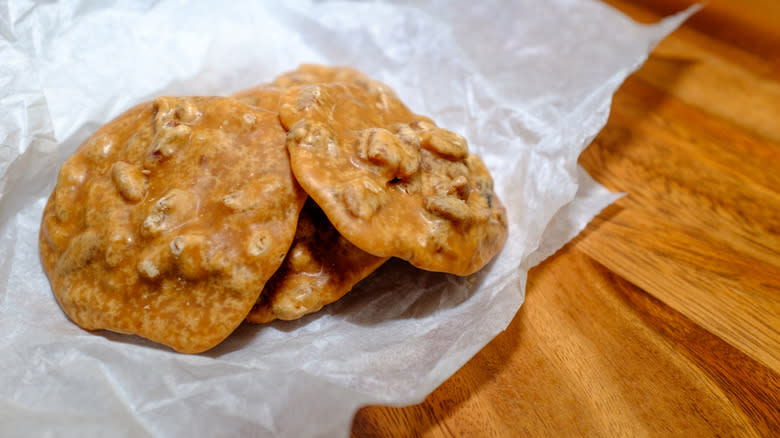
One reason why many folks aren't fans of pumpkin pie is because it's just too gloopy, mushy, and well ... squashy. Your pumpkin pie will be even better with praline added to the equation. This nutty Southern confection is made by combining sugar, pecans, and dairy, and you'll find that incorporating pralines will add a chewy, sweet element to pumpkin pie.
Unlike making pralines to eat on their own, adding praline to your pumpkin pie isn't that hard — and you don't have to babysit this treat over a stovetop. You'll want to combine your ingredients together in a food processor before spreading the resulting paste on top of your par-baked crust. Then, add the filling and pop it into the oven.
Perform A Jiggle Test To Determine Doneness

The trickiest part of baking a custard-based pie is determining when to pull it from the oven. If you leave it in the oven too long, then the eggs in the filling will overcook and leave you with a scrambled-egg texture. But if you undercook it, the filling will leak out when you slice it.
You can rely on a few visual cues that your pumpkin pie is done baking. When you pick the pie up, you should notice that there is a slight jiggle in the center with firmness around the edges. This movement will cease once the pie sets after it's cooled. You can also take the internal temperature of the pie, which should be a minimum of 180 degrees Fahrenheit.
Add A Pie Crust Shield To Prevent Burning

As a baker, you have to keep a watchful eye on your pie to ensure it doesn't overcook or burn. The issue with a custard-based pie with a par-baked crust is that the filling and the crust won't always cook at the same rate. The crust tends to burn faster than the filling can set, which leads to a blistered crust and runny filling.
You can prevent burnt pie crust with this easy hack: using an aluminum pie crust shield. You can buy one of these, or make your own with foil curled around the edge of the crust. Put the shield in place before baking the pie, and remove it when the remaining baking time is down to 20 minutes.
Bake It In Another Appliance Instead Of Your Oven

Pumpkin pie is usually baked in an oven, but this isn't the only way to craft the dessert at home. You can use an Instant Pot pumpkin pie recipe with a 7-inch springform pan. This will ensure the pie fits in the 6-quart appliance and will be easy to remove, but you should also line the inside with parchment paper. The protective layers will prevent water from encroaching into the pie, changing the filling's texture.
You can use a pre-baked pie crust for this recipe, and bake the pie for about 40 minutes. You'll need to allocate approximately an hour for the pie to firm up on the counter, as well as a few hours in the fridge.
To Avoid Cracking, Try A No-Bake Rendition
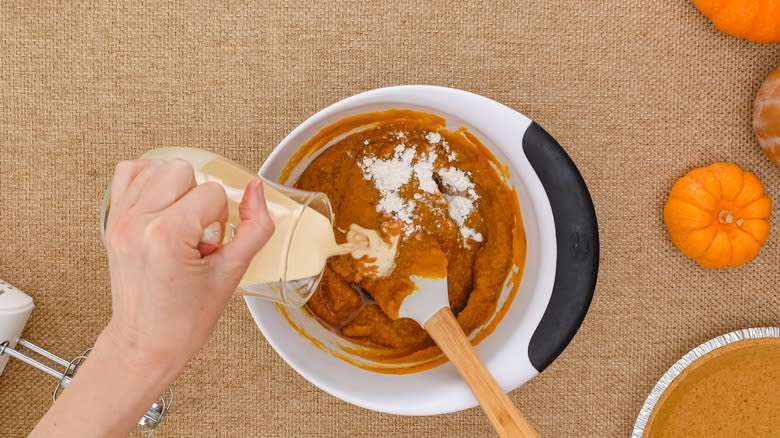
Many novice pumpkin pie bakers are perfectly confident in making their confection ... until it comes to the baking part. So, we recommend taking the easy way out and using a no-bake pumpkin pie recipe instead. The texture turns out more like a hybrid of cheesecake and pumpkin pie — but it's delicious nonetheless.
All you need to do is combine the pumpkin puree with cream cheese, spices, and whipped cream in a graham cracker or cookie crust. You could theoretically use a traditional pastry crust, but the crunchy graham cracker one is easier and more traditional for a no-bake filling. Plus, you can buy it pre-made from the store. It's a recipe that's, well, as easy as pie.
Always Let Your Pie Sit Before Slicing

After the hard work is over, all you want to do is sit down, grab a slice of pie, and chow down. But when it comes to pumpkin pie, patience is a virtue. You should let your pie sit before slicing, because it will allow the filling to thicken.
If your pumpkin pie turns mushy after slicing it, it's likely because you didn't have enough thickening elements in the filling, or you didn't let it set long enough. The cooling time for this pie is between one to two hours at room temperature. After that, you should seal your pie in plastic wrap and pop it in the refrigerator for a few more hours. Never put the hot pie directly in the fridge, because the condensation will cause the crust to get soggy.
Serve It With A Twisted Version Of Whipped Cream
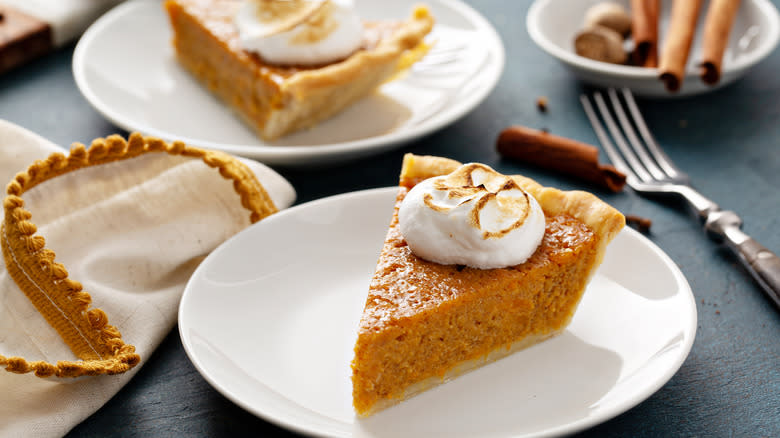
No slice of pumpkin pie is complete without a dollop of whipped cream on top. But instead of just grabbing the can of Reddi-wip from the fridge, try making your own whipped cream with some flavorful additions. One sweet ingredient that will change your whipped cream forever is honey. You can mix it into the heavy cream or whipping cream to add a sweet, organic flair to your topping.
We also recommend trying a boozy rendition of whipped cream with the help of a splash of bourbon. The oaky flavors will add a bit of oomph to the brown sugar and spice notes of the pie. You should be sparing with the booze, though, because too much can alter the pie's taste.
Use Greek Yogurt As A Topping Or In The Filling

Greek yogurt is the secret to moist cakes, muffins, and everything in between. It's also a great addition to your pumpkin pie. Try topping each slice with a dollop of it, or add Greek yogurt to your filling to help boost its moisture content without making it too sweet, like whipped topping would. Full-fat, unsweetened Greek yogurt will help thicken your filling to its fullest potential. It's important to use Greek yogurt for this recipe rather than regular yogurt, because it has a thicker consistency and will hold up better in a filling.
This tangy dairy product is also valuable if you don't have any evaporated milk or sweetened condensed milk in your pantry for the filling. Substitute equal parts of the yogurt for the evaporated milk in the filling, and you'll be well on your way to a thick, creamy pie with slightly fewer calories.
Read the original article on Tasting Table.
